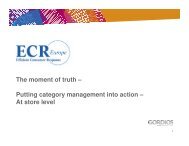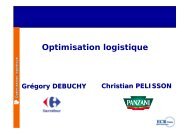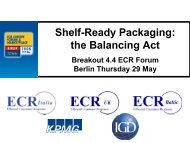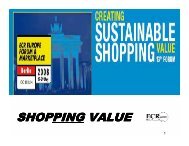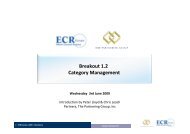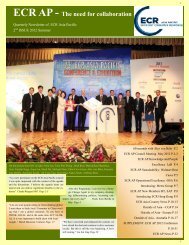You also want an ePaper? Increase the reach of your titles
YUMPU automatically turns print PDFs into web optimized ePapers that Google loves.
42<br />
“...DIFFERENT BUT COMPATIBLE”<br />
There is always a temptation for partners to regard<br />
each supply chain as unique, requiring a unique RTI<br />
solution. This may be the case, but wherever possible,<br />
operating and design principles should ensure that the<br />
preferred system is compatible with other systems.<br />
“...TWO PLUS TWO MAKES FIVE”<br />
Traditionally, supply chain costs have been<br />
commercially sensitive. Can partners trust each other<br />
enough to believe each set of figures? The financial<br />
and the soft benefits and costs must be calculated. If a<br />
competitor adopts RTI there could be a penalty. If the<br />
net benefit is sufficient to justify change, then:<br />
• Negotiate sharing of benefits and costs between<br />
the partners<br />
• Adapt the organisation, methods and systems to<br />
reflect use of RTI and to optimise benefits (if there<br />
was a net benefit using RTI with the existing<br />
organisation, methods and system, there will be a<br />
greater benefit after adoption)<br />
• On-going, find ways to improve the number of<br />
turns achieved per year. Poor RTI utilisation costs<br />
money.<br />
Organisations that can provide assistance include:<br />
• Associations such as EuroCommerce or AIM, who<br />
are aware of RTI progress in their sectors, and can<br />
recommend European and national associations<br />
• <strong>ECR</strong> national boards, now operating in most<br />
Western European countries<br />
• CCG – especially on rules for ensuring compatibility<br />
of RTI designs, and on operating systems for pools<br />
of RTI<br />
• Management Consultants – who can bring<br />
previous experience, objectivity and partner<br />
identification to an RTI project<br />
• Standardisation bodies – such as EAN, CEN or its<br />
national standards institutes, who develop the<br />
standards<br />
• Manufacturers of RTI – generally plastics<br />
manufacturers, who often have a useful overview,<br />
and will be up-to-date on the latest design<br />
techniques<br />
• Commercial Partners – such as manufacturers or<br />
retailers, who may already be using RTI with other<br />
partners; or RTI pool operators and service<br />
providers expanding their businesses.<br />
The Efficient Unit Loads Report



